Dr Anna Blackwell, BSc, PhD
I graduated from the University of Bristol in 2009 with a BSc in Psychology. Following my degree I worked as a learning support assistant at a secondary school in Bristol gaining an in depth knowledge of the practical implications of speech and language impairment for children both academically and socially.
In 2011 I joined the Bristol Speech and Language Therapy Research Unit as a PhD student as part of the Child Talk programme grant. My PhD study used a case study methodology to investigate the dynamics of the relationship between parent and child language for preschool children with early language delay from a developmental perspective. I worked closely with four families over a 12-month period and used a range of methods, including interviews, parent report, observations and the LENA system, which can record a full day of talk from a child’s home environment and automatically analyse the audio.
During my time at the Unit, I developed a strong interest in using both qualitative and quantitative methods, as well as systematic reviewing, to understand what interventions work and for whom. I have subsequently used these skills to explore public health interventions in both academic and third sector organisations.
Dr Jen Chesters, Senior Research Associate
I am was a Senior Research Associate in the BSLTRU. A Speech and Language Therapist and Neuroscientist by background. I completed a Psychology degree at the University of St. Andrews, where I developed an interest in the neural basis of communication. I went on to qualify as an SLT in 2008, through the Speech and Language Sciences MSc course at UCL. I have worked as a Speech and Language Therapist in Learning Disability, Forensic Mental Health and Dysfluency services.
I completed my DPhil (PhD) research in 2016, at the Experimental Psychology Department and Wellcome Centre for Integrative Neuroscience, University of Oxford, supervised by Prof. Kate Watkins and Dr. Riikka Möttönen. My project, which was funded by an MRC Clinical Research Training Fellowship, investigated the use of a non-invasive method for stimulating the brain (transcranial direct current stimulation, or tDCS for short) to promote speech fluency. My PhD included the first randomised controlled trial of tDCS with adults who stutter, and I continued to work with Prof Watkins as a Postdoctoral Research Associate, on a larger study where we further investigated the neural basis of stuttering using a range of brain imaging and stimulation techniques.
I am generally interested in how our brains are organised to produce and perceive speech and language, and how applying this knowledge could improve speech and language interventions. I have a particular interest in speech motor control, and how sensory information is integrated to support this control process.
Current Research
I joined the BSLTRU in November 2020 and left in September of 2022. I mainly worked on the Language Explorer clinical evaluation study, which tested the feasibility of an app for assessing Developmental Language Disorder in children. I also led the study on the impact of living through the COVID-19 pandemic on the lives of people who stammer. I left the unit in December of 2022.
Publications achieved whilst working at BSLTRU
Linked profile of academic output:
Dr Rebecca Coad, BSc, MSc, PhD
BSLTRU Director of Operations
I have worked at Bristol Speech and Language Therapy Research Unit from January 2011to April 2018, most recently as Director of Operations. In addition to this role I worked as the Research Development Manager within the Research & Innovation office at North Bristol NHS Trust and have an Honorary Lecturer position at the University of Bristol, which I continue to do.
My background is in developmental biology and cell therapy, working as a Research Associate at the University of Minnesota USA, before making the move from academia to research management in 2009. My expertise lies in the development, set-up and management of research within the NHS; particularly contract and financial management, obtaining regulatory approvals, delivering complex programmes of research both within acute and primary care settings, people management and strategic planning. My interests lie in maximising the impact of research and ‘adding value.’ I have a particular interest in public patient involvement, specifically how to make it ‘meaningful’ and developing methods for capturing the value/impact.
Selected publications
• Harding, S.A. Coad, R.A. (2016). Supporting and informing speech and language therapy services using the RCSLT Online Outcome Tool (ROOT) for measuring outcomes: Proof of Concept Study. Independent Evaluation for the RCSLT
• Harding, S.A. Coad, R.A. (2016). The RCSLT Speech, Language and Communication Needs (SLCN) Outcome Project – An Independent Evaluation for the RCSLT
• Roulstone, S.E., Marshall, J.E., Powell, G.G., Goldbart, J., Wren, Y., Coad, J., Daykin, N., Powell, J., Lascelles, L., Hollingworth, W., Emond, A., Peters., T.J., Pollock, J., Fernandes, C., Moultrie, J., Harding, S.A., Morgan, L., Hambly, H., Parker, N.K, Coad, R.A. (2015). Evidence based intervention for preschool children with primary speech and language impairment – An exploratory mixed methods study. Programme Grants Applied Research 2015;3(5)
Ms Sophie Cottrell, BA, MSC, MRCSLT
Ms Sophie Cottrell, BA, MSC, MRCSLT
Specialist Speech and Language Therapist
I qualified as a Speech and Language Therapist from City University in 1998 and since that time I have worked with adults with acquired neurological disorders in a variety of settings. My primary interest is in the area of aphasia and I have recently been fortunate to receive funding for a project looking at the use of mindfulness and other cognitive behavioural therapy techniques and their impact on people with aphasia.
I have also carried out research into information-giving for people with aphasia on stroke wards, which culminated in the publication of ‘Stroke Talk’, an aphasia-friendly resource for people in hospital following stroke.
Current Research
Systematic review: Are mindfulness and other CBT techniques effective in improving communication in people with acquired, non-progressive aphasia?
Researchgate profile
Professor Pamela M. Enderby, MBE DSc (Hons), PhD, MSc, FRCSLT
Emeritus Professor of Community Rehabilitation
I am Emeritus Professor of Community Rehabilitation at University of Sheffield. I qualified as a Speech and Language Therapist in 1970 and from an early stage in my career combined research with clinical practice. My PhD was awarded by Bristol University in 1983 where I studied assessment processes of dysarthria.
Prior to coming to Sheffield I held several positions in speech and language therapy in Bristol, instigated the establishment of the first AAC centre in Frenchay Hospital and established the speech and language therapy research unit there. I am proud that I was able to stimulate the first National Speak Week in 1986 which was precursor to other initiatives aimed at improving public awareness of the difficulties of those with speech, language and communication disorders.
I was awarded a Fellowship of the College of Speech Therapists in the same year and a decade later (1993) was honoured with an MBE for services to speech and language therapy. I was awarded a doctor of science by the University of the West of England in 2000.
I was Chair of the Royal College of Speech and Language Therapists (1994) and served on many College committees over the last 20 years. I have been serving on the board again since 2014. I have been President of the Community Rehabilitation Team Network since its inception in 1996 and have served as the President of the Society for Research in Rehabilitation (1994 to 1996) following serving on many council committees associated with this interdisciplinary research Society. I have been that a member of the IALP for 25 years and currently I am president elect.
I was given life membership to the British Society of Rehabilitation Medicine in recognition of my contribution. I have assisted the Department of Health on several working groups related to guideline, policy and strategy development. I was Clinical Director of the South Yorkshire Comprehensive Local Research Network from 2008 to 2011. I have been chair of South Yorkshire HealthWatch between 2011 and 2014.
Read my staff profile at Sheffield University
Matt Fell BSc, MBChB, MRCS
NHS Plastic Surgery Registrar
I have been dedicated to a career in cleft lip and palate surgery for many years and have focused my efforts both clinically and academically towards gaining experience in this field. I studied undergraduate medicine and surgery at the University of Manchester and qualified as a junior doctor in 2011. I started a 6-year training programme in Plastic Surgery in the South West of England in 2016. I have a passion for global reconstructive surgery and work with a number of chartable organisations related to this area.
Current Research
The Vocational Training Charitable Trust (VTCT) has awarded a grant to enable me to undertake a year in research at the North Bristol NHS Trust and with the Cleft Collective. I will investigate the causal link between maternal cigarette smoking and orofacial cleft using a triangulation approach. The methodologies I will use include systematic review and meta-analysis, natural experiment and a Mendelian Randomisation study. This project will contribute to our growing knowledge about the role of environmental factors in the cause of cleft lip and palate.
Linked profile of academic output:
Dr Helen Hambly, BSc (Hons), MSc, PhD
Helen worked as a researcher on a variety of projects between 2009 and 2015. These included exploring children and parents’ preferred outcomes of support as part of the Better Communication Research programme, investigating speech and language therapists’ decision making for prioritising children for speech and language therapy and analysing parent and children’s perspectives of speech and language therapy as part of ‘Child Talk’. Helen also completed her PhD – a qualitative study exploring children’s, families’ and professional’s experiences of language impairment.
Read my staff profile at Exeter Medical School.
Dr Rosemarie Hayhow, MSc, PhD, FRCSLT
Honorary researcher BSLTRU
Rosemarie qualified as a SLT in 1969 and worked with a varied caseload until the completion of her Masters in 1975 (University of London). She specialised in stammering working mainly with adults, teaching undergraduates and undertaking treatment evaluation research. She obtained a Diploma in Personal Construct Psychology in 1989 and included children in her clinical work.
Rosemarie moved to Bristol in 1995 to a clinical post with children and adults who stammer. She studied the Lidcombe Program in Australia and was seconded to a stammering research study at BSLTRU in the late 1990s. Her PhD study (University of the West of England, 2009) focused on parents’ experiences of the Lidcombe Program and she was awarded a Fellowship of the RCSLT for her work in stammering.
Rosemarie is an advisor for both the British Stammering Association and the RCSLT and a founder member of the Lidcombe Program Trainers’ Consortium. She is an occasional reviewer for academic journals. The research topics have mainly developed from clinical questions and been influenced by an interest in personal meanings and experiences and by the variations in responsiveness to treatment that are evident in clinical work. She has worked with members of the ALSPAC team investigating outcomes for children who stammer.
Researchgate profile
Ms Hannah Lane, BSc (Hons)
Speech and Language Therapist
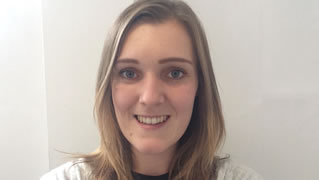
I studied Speech and Language Therapy at Birmingham City University and graduated in 2016. I work as a paediatric Speech and Language Therapist for Doncaster and Bassetlaw Hospitals NHS trust. I work in the community and my role is split across community clinics, a severe learning disability school and pyramids of mainstream schools. I am also the Cleft Lip and Palate LINK therapist so am responsible for the management and therapy for a caseload of children with Cleft Lip and Palate and an important part of my job is liaising with regional Cleft hubs and specialists.
My work with the Unit was a project which formed part of my internship with the National institute of Health Research which will took place over 6 months in 2017-2018. The project explored the impact of early intervention on speech in children born with cleft palate. This is an area of significant interest to me and I am hoping to contribute to the growing evidence-base for children with speech difficulties.
Dr Rosalind Merrick, BSc, PGCE, MSc, MSc, PhD
Speech and Language Therapist and Associate Tutor
Bristol Speech and Language Therapy Unit has played an essential part in facilitating my research activity while working as a practitioner. The Unit has been a hub through which I have made professional contacts and exchanged creative ideas to stimulate research initiatives. Sue Roulstone in particular provided mentorship and consultation on research design and sources of funding. My PhD and publications have been an outcome of the support from Prof Roulstone in association with the University of the West of England.
I am part of the teacher training team at the Centre for Inclusive Education, University College London Institute of Education, lecturing and tutoring teachers on programmes such as the National Award for Special Educational Needs Coordination. I am a practising Speech and Language Therapist.
I am the author of Picture Me: Children’s Views of Speech, Language and Communication Needs (2014) and contributed to the BETT Award winning TES Institute online course High Quality Teaching for SEND in School (2016).
Mrs Sarah Overton, MA (Hons), BSc (Hons)
Speech and Language Therapist
I qualified as a Speech and Language Therapist at Newcastle University in 2008 and have been working with children and young people ever since.
During my year as a Research Assistant at BSLTRU I worked part-time on a study with Dr Yvonne Wren exploring the potential use of language transcription and analysis software for outcome measurement. The study explored whether it was feasible and reliable for an Assistant Speech and Language Therapist to carry out language transcription as a way of surmounting the time constraints that prevent Speech and Language Therapists from routinely transcribing language samples themselves. Our research was presented at the Child Language Seminar (Newcastle University, 2012) and published in Child Language Teaching and Therapy (2014).
Holly Peryer BSc (Hons) Senior Specialist Speech & Language Therapist
Holly undertook a secondment with the Bristol Speech & Language Therapy Unit in 2019, in addition to her specialist clinical role with the West Midlands Cleft Lip & Palate Service where she had worked since 2009.
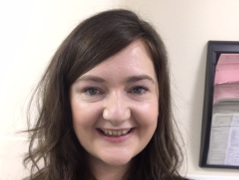
Holly completed her MSc in Speech & Cleft at the University of Sheffield in 2016. Holly's MSc dissertation highlighted differences in the bilabial sound development of infants with bilateral cleft lip and palate undergoing differing surgical lip repair protocols.
Dr Brian Petheram, BA, PhD, FRCSLT (Hon)
Dr Brian Petheram, BA, PhD, FRCSLT (Hon)
Consultant
My background is in computing and information systems but since 1984 my main research interest has been in the application of these technologies to the rehabilitation of aphasia. I was a founder member of the Unit and a former co-director but am now mostly retired. I still work on the Aphasia Software Finder project funded by the TTA and I still attend the Unit strategy meetings and seek to contribute to the Unit in the areas of aphasia and technology.
Current research
Aphasia Software Finder
Anna Prince, BSc (Hons) (Anatomical Sciences), MSc (Speech and Language Therapy) MClinRes
Speech and Language Therapist
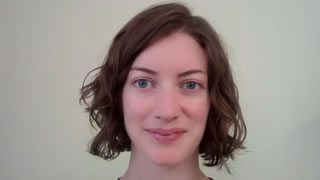
I qualified as a speech and language therapist (SLT) in 2010 and have worked as a Paediatric SLT since then. I have worked with children with a wide range of speech, language and communication needs. I now work as part of the Mainstream Schools and Specialist Stammering Services for Bristol and South Gloucestershire. I have completed a Masters in Clinical Research funded by the National Institute for Health Research (NIHR). During my Masters I undertook research into the Fluency Trust Residential Course - an intervention for teenagers who stammer.
Current research
The impact of a residential speech and language therapy course for adolescents who stammer.
Researchgate profile
Ms Miriam Seifert, BSc (Hons)
Specialist Speech and Language Therapist
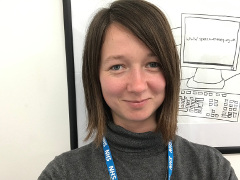
I completed the BSc (Hons) in Speech and Language Therapy at Plymouth Marjon University in 2012. Since then, I have lived in Bristol where I worked in the community service until 2019. During this time, I completed the MSc in Speech and Cleft Palate at the University of Sheffield, co-chaired the South West Speech CEN, worked in the South West Cleft Palate Service covering maternity leave and worked on various projects with the Bristol Speech and Language Therapy Research Unit (BSLTRU). I am now directly employed by BSLTRU and am continuing my work with the cleft palate service.
My work at BSLTRU has been varied. I have been in involved in the Cleft Collective Cohort Study where we are analysing the babble of 13 month old babies born with a cleft lip and/or palate using a method called Time Stamper. I have also been working with Therapy Box on The Language Explorer app, which is a tool to assist speech and language therapists to evaluate children’s language through story re-tell.
Publications
Seifert, M., Morgan, L., Gibbin, S., and Wren, Y. (2019). An alternative approach to measuring reliability of transcription in children’s speech samples: extending the concept of near functional equivalence. Folia Phoniatrica et Logopaedica. https://www.karger.com/Article/Abstract/502324
Linked profiles of academic outputs
Mrs Jennifer Short, BSc (Hons) Speech Sciences
Specialist Speech and Language Therapist
I qualified as a speech and language therapist from UCL, London in 2002 and after a stint in the Outer Hebrides in a broad generalist post I specialised with adults with acquired and progressive neurological conditions. I have worked most of the rest of my career in Bristol and have also developed a specialism in working with adults who stammer, currently co-chairing the South West Disorders of Fluency CEN. Although my first love in my clinical career was in acquired aphasia, I have seen an increasing number of clients referred with ‘psychogenic’ or ‘functional’ dysphagia or communication problems, and have become aware of the lack of research and evidence-based practice guidelines for this client group.
Research profile
https://www.researchgate.net/profile/Jennifer_Short2
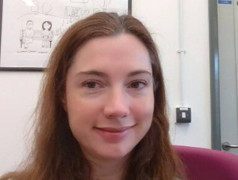
Mrs Fay Smith
Research Administrator
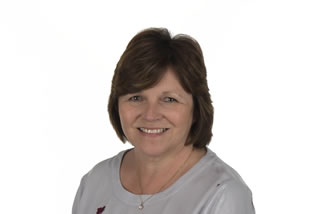
Fay joined the Bristol Speech and Language Therapy Research Unit in 1996, as an administrator initially for the Aphasia Computer Team (ACT), then taking an active role in other research projects as admin support/coordinator. She supported all of the researchers in undertaking and delivering their research activities and projects as a whole. Fay retired in March 2022 to travel the world and do great things.
Mrs Helen Spear, BSc (Hons) Speech
Mrs Helen Spear, BSc (Hons) Speech
Speech and Language Therapist
I have been working as a speech and language therapist with adults with acquired neurological problems since qualifying in 1987.
Part of my current role is within the neuro-oncology team where I work with the patient and their family throughout their cancer pathway. A key part of my input is with patients undergoing language mapping during awake craniotomy. It is this work that brings me to be part of the team at the research unit. I am working with patient public involvement about the process of awake craniotomy as well as looking at the clinical needs and adjustments required for working with a patient during the actual awake craniotomy procedure.
Mrs Stephanie Ticehurst, PGDip, BSc, Cert MRCSLT, EMCC
Clinical Lead BSLTRU,
Professional Head Adult & Acute Speech and Language Therapy Services,
Visiting Research Fellow Sheffield Hallam
I worked as the Professional Head of the Speech and Language Therapy Service North Bristol NHS Trust, Clinical Lead at the Bristol Speech and Language Therapy Research Unit and a Visiting Research Fellow with the Centre for Health and Social Care Research, Sheffield Hallam University.
I qualified as a Speech and Language Therapist at University College, London and have coaching qualifications as a performance and a health coach. I have over 30 years’ clinical experience working with adults with communication and swallowing difficulties resulting from acquired neurological conditions and specialised in communication and swallowing difficulties related to stroke, progressive neurological conditions and traumatic brain injuries.
Professionally I represented the Royal College of Speech and Language Therapists for the Department of Health’s Stroke Strategy and Stroke Programme Board and was part of the expert panel of the Royal College of Physicians Intercollegiate Stroke Working Party.
My interests are in making clinical services effective, cost efficient and responsive to the goals of the person with communication and or swallowing difficulties.
Selected publications
• August 2006 Workforce Planning – piloting a Royal College of Speech and Language Therapists Workforce Planning Project
• August 2002 Dean J, Ticehurst S. Absolutely Basic. Planning a speech and language therapy service for disabled adults (16-64 years) with a primarily physical impairment. Bristol: DART,
• Hadar, Uri; Ticehurst, Stephanie; Wade, John P. Crossed anomic aphasia: Mild naming deficits following right brain damage in a dextral patient. Cortex Vol 27(3), Sep 1991, 459-468
Researchgate profile https://www.researchgate.net/profile/Stephanie_Ticehurst
Dr Julia Wade, BA, MSc, PhD
Research Speech & Language Therapist
I qualified as a speech and language therapist in Newcastle in 1994 and worked clinically with children and adults with a range of speech and language disorders (acquired neurological, voice disorders, laryngectomy) before joining the Bristol Speech and Language Therapy Research Unit in 1999.
During my time at the Bristol Speech and Language Therapy Research Unit I worked on a project investigating how people with aphasia use computers in therapy and this work formed the basis of my PhD (2005) supervised by Professor Pam Enderby and supported by funding from the Underwood Trust and the Stroke Association: An investigation into the impact of computer therapy on people with aphasia.
Since 2005 I have worked in the School of Social & Community Medicine, University of Bristol as a qualitative researcher within the NIHR HTA funded randomised controlled trial of treatments for localised prostate cancer, ProtecT.
Professor Ray Wilkinson, BSc, Certificate to Practise (in Speech and Language Therapy), MA, PhD
Professor of Human Communication
I was based in the Bristol Speech and Language Therapy Research Unit between 1990 and 1994. I undertook my PhD there (on the analysis of conversations involving a person with aphasia) while also working as a speech and language therapist at Frenchay Hospital. Pam Enderby, then head of the unit, was one of my supervisors. On completion of my PhD in 1994 I took up an academic post at University College London, before moving to the University of Manchester (in 2008) and then the University of Sheffield (in 2012).
I am based in the Department of Human Communication Sciences at the University of Sheffield, where I research and teach on a range of topics including acquired neurogenic disorders, the communication skills of professionals, and the acquisition of interactional abilities in normally developing children.
Read my staff profile at Sheffield University.
Mrs Caroline Williams, BSc (Hons), PGCert, Cert M RCSLT
Caroline qualified as a speech and language therapist from Newcastle University in 2012. Since then, she has been a community therapist working with children with special needs and autism in Durham. Caroline joined the regional cleft lip and palate service in Newcastle in 2013 and has also had the opportunity to work part time with the community paediatric service in Newcastle. Caroline has completed a post graduate certificate in Cleft Palate Studies at the University of Sheffield.
Caroline has a specific interest in children with speech sound disorders and cleft palate. Caroline has worked on service development and audit projects related to the impact of early intervention and predicting speech outcomes at a young age. Most recently she has been involved in a scoping review with other members of regional cleft teams.
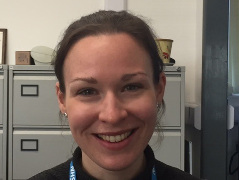
Mrs Sarah Woodward, BA (Hons), BALBIT, PGDip, CCS
Speech & Language Therapist
I worked at the unit in 1999-2000 on the PCAD project (a European project looking at a portable AAC device specifically designed for people with aphasia). In 2010 I worked in the unit to support the setting up of the Aphasia Software Finder where I continue to be the dedicated SLT. The Aphasia Software Finder is now entirely hosted and funded through the Tavistock Trust for Aphasia so the work continues outside the BSLTRU.
Dr Lydia Morgan, BmedSci, PGCert, PhD
Research Associate
I qualified as a Speech and Language Therapist in 2006 from Sheffield University. Since then I have primarily worked in research, completing a PhD in 2013 exploring evidence of deficit and theory of therapy in children with specific receptive language impairment. Since 2016 I’ve worked clinically in the adult acute setting a long side my research post.
My primary research interests are in theories of therapy and language impairments. I have worked on a range of projects at the unit, which have given me experience with qualitative and quantitative data, as well as systematic reviews. I’m particularly interested in theories of therapy, and since working clinically, understanding how we can strive to join up research with clinical practice. I’m currently principle investigator and research associate on a study looking at the feasibility of an exercise ball/programme for swallowing in frail elderly people. This is a departure from my previous research experience which has been with children, but I’m excited to be doing some adult and clinically based research.
Selected publications
- Morgan, L., Overton, S., Bates, S., Titterington, J., Wren, Y. (2021) Making the case for the collection of a minimal dataset for children with speech sound disorder. International Journal of Language and Communication Disorders, doi:10.1111/1460-6984.12649
- Coad, J., Harding, S., Hambly, H., Parker, N., Morgan, L., Marshall, J., Roulstone, S.(2020) Perspectives of preschool children in England with speech and language needs in the development of evidence-based activities. Child Care Health and Development, 3:283-293.
- Morgan, L., Marshall, J., Harding, S., Powell, G., Wren, Y., Coad, J., Roulstone, S. 2019 'It depends': Characterizing speech and language therapy for preschool children with developmental speech and language disorders. Int J Lang Commun Disord.; 54(6):954-970. doi:10.1111/1460-6984.12498
- Seifert, M., Morgan, L., Gibbin, S., Wren, Y. (2020) An Alternative Approach to Measuring Reliability of Transcription in Children’s Speech Samples: Extending the Concept of Near Functional Equivalence. Folia Phoniatr Logop, 72:84–91. doi.org/10.1159/000502324
- Morgan, L. and Wren, Y. 2018. A Systematic Review of the Literature on Early vocalizations and Babbling Patterns in Young Children. Communication Disorders Quarterly.
- S.E. Roulstone, J.E.Marshall, G.G. Powell, J. Goldbart, Y.E. Wren, J. Coad, N. Daykin, J.E. Powell, L. Lascelles, W. Hollingworth, A. Emond, T.J. Peters, J.I. Pollock, C. Fernandes, J. Moultrie, S.A. Harding, L. Morgan, H.F. Hambly, N.K. Parker, R.A. Coad. (2015) Evidence based intervention for preschool children with primary speech and language impairments – An exploratory mixed methods study. Programme Grants for Applied Research. NIHR Journals Library www.journalslibrary.nihr.ac.uk
Researchgate profile
https://www.researchgate.net/profile/Lydia_Morgan3
Affiliations
Bristol Medical School - Paediatrics and child health
Dr Lucy Southby, BA (Hons), MSc, PG Cert. MRCSLT
Senior Research Associate (BSLTRU)
I am a Clinical Academic Speech and Language Therapist. I qualified as a Speech and Language Therapist in 2005 with an MSc in Speech and Language Sciences from University College London and have spent time working clinically in different clinical settings in the UK and New Zealand including, acute hospital in-patient settings with both adults and children, a craniofacial unit, a child development centre and specialist cleft lip and palate services. I completed a Post Graduate Certificate in Cleft Palate Studies at the University of Sheffield in 2011 and was awarded my PhD by the University of Bristol in 2021. My PhD was completed as part of a Health Education England (HEE)/National Institute for Health and Care Research (NIHR) Clinical Doctoral Research Fellowship. I investigated the relationship between different speech input processing skills and speech articulation at the age of 5 years in children born with a cleft palate.
I have been Lead Specialist Speech and Language Therapist for Cleft.NET.East, the regional cleft lip and palate service for the East of England based at Addenbrooke’s Hospital in Cambridge since January 2017. I am also a member of the National Institute of Health Research (NIHR), Clinical Research Network Children Early Career Researchers in Cleft and Craniofacial Conditions and Cleft and Craniofacial Conditions Clinical Studies Groups.
In my part-time SRA role at the BSLTRU, I work with The Cleft Collective cohort studies including the Speech and Language cohort, and work on cleft related studies, some of which use data from The Cleft Collective resource.
Current research
Understanding the impact of the COVID-19 pandemic on the early speech and language development of children born with cleft lip and/or palate.
Investigator: Lucy Southby, Yvonne Wren, Amy Davies, Sharon Baker, Helen Extence, Neil Brierley
Timescale: January - December 2023
Funder: CLEFT Bridging the Gap Charity https://www.cleft.org.uk/
During the COVID-19 pandemic, treatments for children born with a cleft were often delayed and the environment that young children were exposed to was different because of lock downs, social distancing and face masks. This research aims to understand whether these differences from the pandemic have had an impact on the early speech and language development of children born with a cleft. Using data from The Cleft Collective cohort studies, this work will describe the early speech and language skills of children born with a cleft (up to age 2 years) who were born just before or during the pandemic and compare them to children who reached age two years before the pandemic started.
This study uses existing data from The Cleft Collective resource (http://www.bristol.ac.uk/dental/cleft-collective/professionals/access/).
Selected publications
• Southby, L., Harding, S., Davies, A., Lane, H., Chandler, H. & Wren, Y. (2022) Parent/Caregiver Views of the Effectiveness of Speech-Language Pathology for Children Born With Cleft Palate Delivered via Telemedicine During COVID-19. Language, speech, and hearing services in schools. pp.1-10.
• Southby, L., Harding, S., Davies, A., Fell, M. & Wren, Y. (2021) Speech-Language Pathology Provision During the COVID-19 Pandemic for Children Born With Cleft Palate in the United Kingdom—Parent/Caregiver Perspectives and Experiences. Perspectives of the ASHA Special Interest Groups. 6(6), pp.1809-1819.
• Southby, L., Harding, S., Phillips, V., Wren, Y. & Joinson, C. (2021) Speech input processing in children born with cleft palate: A systematic literature review with narrative synthesis. International Journal of Language & Communication Disorders. 56(4), pp.668-693.
